Review of the Day: My Head Has a Bellyache by Chris Harris, ill. Andrea Tsurumi
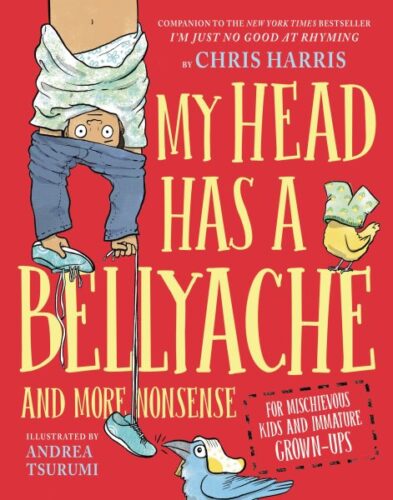
My Head Has a Bellyache and More Nonsense for Mischievous Kids and Immature Grown-Ups
By Chris Harris
Illustrated by Andrea Tsurumi
Little, Brown and Company
$19.99
ISBN: 978-1-316-59259-8
Ages 9-12
On shelves now
Better than Shel Silverstein.
A bold statement. Unprovable too. Strictly a matter of personal opinion. And, considering the fact that my generation was raised on a healthy diet of Silverstein (with just a smattering of Jack Prelutsky as a palate cleanser) one might even go so far as to call it a dangerous opinion. After all, by even stating that the Chris Harris collection of poetry My Head Has a Bellyache is better than, say, Where the Sidewalk Ends I am setting up some kind of cross-generational rivalry, and pre-prejudicing parents everywhere against a book that is not simply one of the best books for kids of the year, but one of the greatest poetry collections for kids ever written. I mean, we’re talking Ogden Nash/Dorothy Parker levels of greatness here, people. But to say that it’s better than Silverstein? A bad idea. Unless, of course, I can explain to you precisely why this book is better than any by the guy who made “Hug-o-War” (love you, Shel, but what the heck were you doing with that poem?!?). Folks, I see the challenge before me and I raise you one Chris Harris and one Andrea Tsurumi. A literary power duo the like of which the world of literature for kids has never seen.
96 poems sounds like a lot of poems, I know. So don’t worry. There are actually more like 95 poems in the collection My Head Has a Bellyache. A wild array of different types and styles, jokes and gaffs, this book has it all. There are haiku limericks, “haiku limerick”/”limerick haiku” limericks, and (naturally) “‘haiku limerick’/’limerick haiku’ limerick” villanelles. There are poems with titles like “Okay, Listen Up, I’m Not Going to Eat Any Broccoli Tonight, But Don’t Freak Out. It’s Okay. I Already Have a Very, Very Healthy Diet. Let Me Explain Why” and poems with titles like “Pants”. In the course of your reading, snakes will escape (or be set free). A meteor will destroy at least one poem in this book. A mosquito? It will die and no one will be sad. In short, you don’t quite know what’s going to happen in this collection. You can only know that it’s going to be amazing and that kids are going to freakin’ love it.
ADVERTISEMENT
ADVERTISEMENT
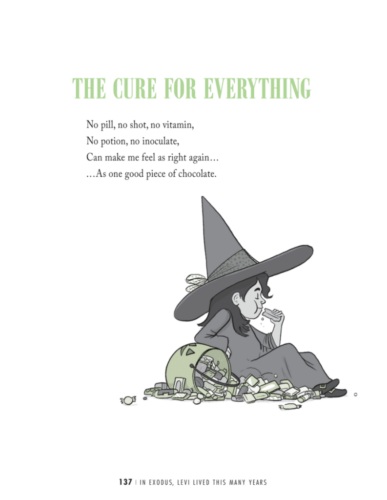
When Chris Harris wrote his previous funny collection of poetry for kids called I’m Just No Good at Rhyming it was good but it did contain the occasional misstep. There was some fatphobia and the percentage of hilarious to mildly amusing poems was decent if not extraordinary. It felt, quite frankly, like a warm up act. Harris was beginning to flex his muscles but he had a little way to go. Bellyache, in contrast, is a homecoming, but one with mysterious origins. Trying to figure out how a writer comes up with a series of funny poems feels a bit like dissecting a frog. Plus, if I’m going to be totally honest here, I have absolutely no idea how someone goes about it. I hesitate to say that a person must be intrinsically gifted but, well, let me just write one of Harris’s poems out right here. It’s not one of the gut-busters, mind you, just a really excellent example of how to write a good, sweet, short little poem that works and is like no other I’ve seen before. This is “The Cure for Everything”: “No pill, no shot, no vitamin, / No potion, no inoculate, / Can make me feel as right again… / …As one good piece of chocolate.” There’s an art to that.
Writing a book of funny poems for kids is no easy task. But apparently Harris wasn’t feeling like he was making this job hard enough for himself. Perhaps he sat in front of a roaring fire one day and said to himself, “Funny is good. Now how can I crank the difficulty level on this book up to 11? I know! I’ll make some of the poems honestly heartwarming too!” And this is where Harris gets the edge over the aforementioned Silverstein. Humor requires one set of muscles, emotional connection another. And for whatever reason, Harris is particularly good at both. Perhaps a bit more skilled in the funny bone department, but when I read a poem like “Watch Out, World!” I can’t help but feel the strings on my heart get tugged. Harris is at his best when he’s talking about relationships, particularly between kids and their adults. There aren’t too many such poems in this book, and one might wonder why there are any in here at all. To this, I am going to give Shel Silverstein a great deal of credit. For all that I’m dumping on him today, the man was brilliant and was very much the poet who established the form for all funny poetry collections for kids to come. Include only silliness without a touch of heart and you risk producing a book that can be written off as mere ephemera. Little better than one of those National Geographic joke books. Too much heart and you’ll have the kids snoring in the aisles. The ratio, therefore, has to be there and it has to be just right. Example A: This book.
I think few people who challenge the statement that funny books fare poorly when it comes to winning major literary awards. I once asked preeminent funny author Jon Scieszka (who has won a fair number of such awards himself) why he thought this was and he postulated a fairly good theory. If you read a book about a dead dog then most readers are going to feel sad. We share the same emotion. But if someone writes a book with jokes or funny things in it, that’s a different beast entirely. Everyone has a different sense of humor. What I find hilarious you might find disgusting and another person might find only mildly droll. Such different variegated opinions mean that it’s much harder for a committee to reach a quorum on a funny book than a sad one. A bit unfair, but that’s the way it falls out in all forms of entertainment-related awards, whether we’re talking the Oscars or the National Book Awards (QUICK! Name the last laugh-out-loud National Book Award winner!). This is a bit on the unfair side when we consider books like My Head Has a Bellyache. I personally believe that this is one best-written children’s books I’ve ever had the pleasure to read. That mix of jokes that continually land and do new things I’ve never seen before combined with honest-to-goodness heart? How can I adequately convey to you how difficult that magic combo is to write?
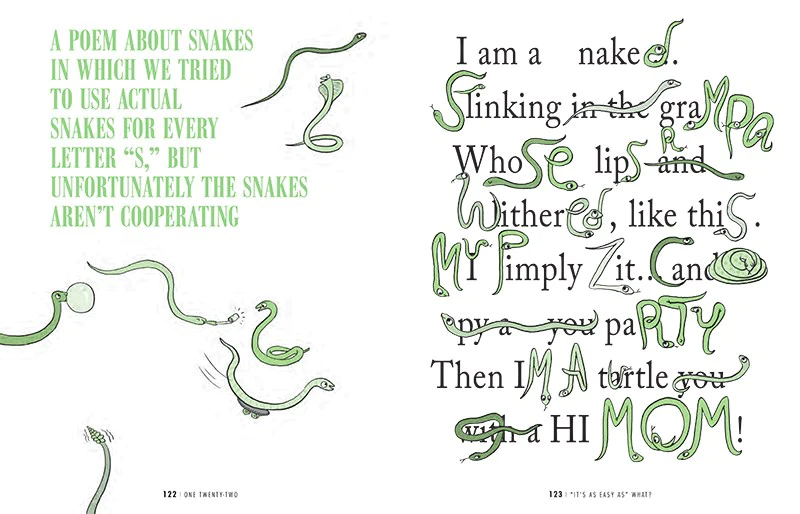
For that matter, major awards for works of children’s literature are not handed out on a sliding scale of difficulty, but wouldn’t it be kind of neat if they were? It’s always sort of struck me as unfair that there are some books out there where the authors spent literal years in research and/or working out the finer details of a title that are indistinguishable (from a marketing standpoint anyway) from the books where someone just sort of dashed off an idea in their spare time without a second thought. And I can say with certainty that there really isn’t any award for books for kids that celebrates this level of work. Mind you, just because buckets of blood, sweat, and tears are poured into a book, that’s no guarantee that it’s actually going to be any good in the end. In the case of Mr. Harris, one would not normally ascribe a collection of poetry in the same breath as, say, a work of nonfiction that involved years’ worth of original research. Not normally, that is, until you drill down into what he’s done here. And what has he done?
ADVERTISEMENT
ADVERTISEMENT
So, first and foremost, there are the poems themselves. Then there are the poems that refer to one another throughout the book (the stray buffalo, the snakes that are standing in for the letter “s”, etc.). Then there are the page numbers, almost every single one of which is a joke or point of brilliance (example: for page 124 it says after the number, “The First Four Digits, If “3” Has Been Cut”). Then there’s the section on “What Happened to Everyone In This Book” that refers back to fourteen poems, concluding their characters’ stories, AND it all rhymes. Then the Glossary of Terms which, you guessed it, friggin’ rhymes. Are we done? We are not done because then you get the Index by Title (which contains a lot of jokes of its own) and then the Index by Subject (personal favorite faux inclusion is, “Dancing angry bears who are brothers: Not in the book, but wow, that would be cool.”). The sheer number of gags there are breath-taking, but we are NOT done because on the very last page are “Books By Chris Harris and Andrea Tsurumi,” “Books By Chris Harris, But Not By Andrea Tsurumi”, “Books By Andrea Tsurumi But Not By Chris Harris (Partial List)”, “Books By Neither Chris Harris Nor Andrea Tsurumi (Partial List)”, and finally “Non-Books By Neither Chris Harris Nor Andrea Tsurumi (Partial List)” which contains, amongst other things, “Belgium”.
All that and have I even once mentioned the art of Andrea Tsurumi in all this? I have not! And this is a crying shame because Tsurumi turns out to be a perfect match for this text. In his previous book I’m Just No Good at Rhyming, Harris was paired with Lane Smith. This was a bit of a mixed blessing. On the one hand, Smith is one of our rare illustrators that manage to be considered both high art and capable of genre-bending hilarity. Pairing him with Harris lent Harris’s book a patina of class to those folks that remember that Stinky Cheese Man one of the classics. That said, it wasn’t a perfect pairing. Smith, for good or for ill, will always be most closely associated with the aforementioned Jon Scieszka. So it was important in this second book for Harris to create his own Smith/Scieszka partnership. Preferably with an illustrator who’s established but not yet (YET) a household name. I literally cannot think of a single artist who could have been a better fit than Andrea Tsurumi. Tsurumi (they/them) made their debut with the singularly mind-blowing picture book Accident but didn’t start getting enough deserved attention until they paired with Jarrett Dapier on Mr. Watson’s Chickens. If I were to describe their style, I’d probably go with something like “Peak Chaotic Control.” Things are forever getting out of hand in a true Tsurumi title but somehow they’re able to make you feel safe at the same time. Like the reader is sitting in the eye of the storm while the world explodes around them. And nowhere is this better put to the test than in My Head Has a Bellyache.
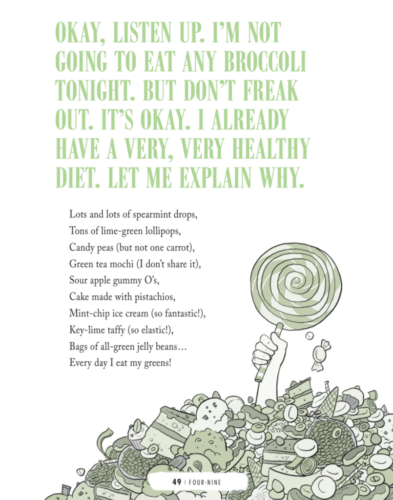
We cannot know how Chris Harris chooses to present his poems to his artistic collaborators. Does he offer illustration notes? Typography suggestions? Design nudges? What we do know is that as with some of the best books for kids, the words and the images in this book work in perfect tandem with one another. Printed in just black and green (as any librarian will tell you, kids will avoid pure black and white books like the plague but don’t object to single-color illustrated titles) Tsurumi doesn’t just have to match the words Harris is presenting here but the tone as well. That means that for a poem like “I Couldn’t Decide Which Version of This Poem I Liked More, So Here Are Both of Them” they can create clocks with legs bashing into one another in a cacophony of madness but then for a poem like “You, Me, a Canoe, and All Sunday”, they must shift to a simpler, quiet, even evocative nature scene. Done incorrectly the reader would experience a bit of a shock. Fortunately both Tsurumi’s art and whosoever chose the order of the poems in this book (which is an art in and of itself) are capable to making such transitions with seeming effortlessness. Andrea Tsurumi’s art is like a duck. Up above, they make it look easy. Down below, they’re paddling for all they’re worth!
After I finish writing this review I’ll put it on my blog (A Fuse #8 Production), on Goodreads, and on Amazon (not necessarily in that order). And inevitably (probably on Goodreads) maybe tomorrow, maybe 10 years from now, someone will come along and write something along the lines of, “You wrote more words in your review than there are in the book!” But in this particular case I’m not actually certain that that’s true. If you are afraid of words, particularly those of the clever variety, this is not the book for you. Harris loves wordplay. Tsurumi loves to complement those words with hilarious madcap art. Put the two together and you’ve got yourself a powerhouse combination.
Said it once.
Said it twice.
Better than Shel Silverstein.
On shelves now
Source: Galley sent from publisher for review.
Videos:
For the record, I think this is a marvelous video in its entirety.
Filed under: Best Books, Best Books of 2023, Reviews, Reviews 2023
About Betsy Bird
Betsy Bird is currently the Collection Development Manager of the Evanston Public Library system and a former Materials Specialist for New York Public Library. She has served on Newbery, written for Horn Book, and has done other lovely little things that she'd love to tell you about but that she's sure you'd find more interesting to hear of in person. Her opinions are her own and do not reflect those of EPL, SLJ, or any of the other acronyms you might be able to name. Follow her on Twitter: @fuseeight.
ADVERTISEMENT
ADVERTISEMENT
SLJ Blog Network
Name That LEGO Book Cover! (#53)
Exclusive: Vol. 2 of The Weirn Books Is Coming in October | News
Fighting Public School Book Bans with the Civil Rights Act
Take Five: Middle Grade Anthologies and Short Story Collections
ADVERTISEMENT



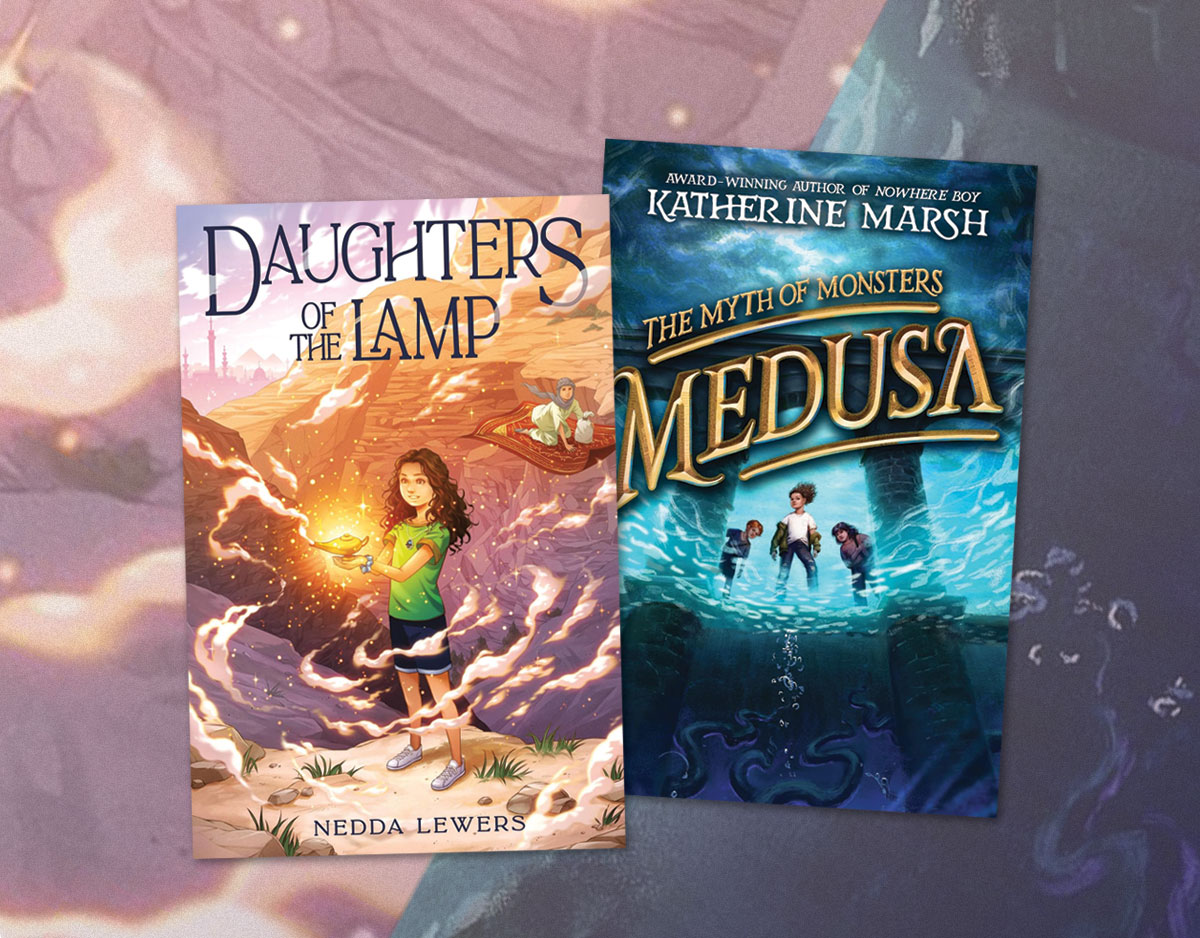
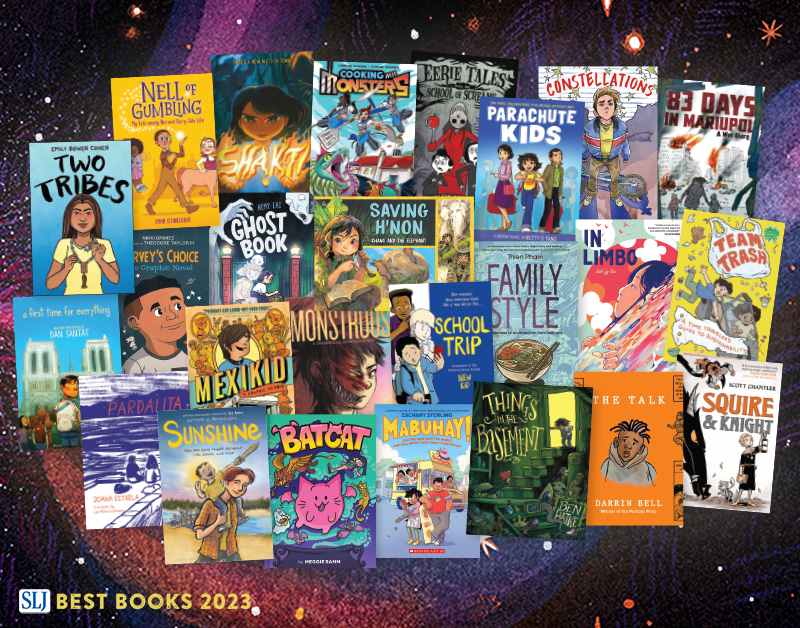
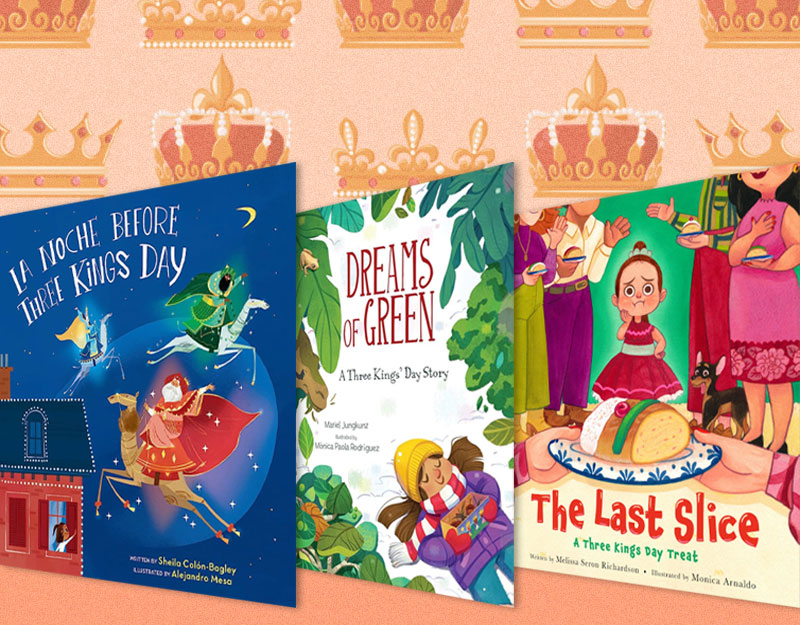
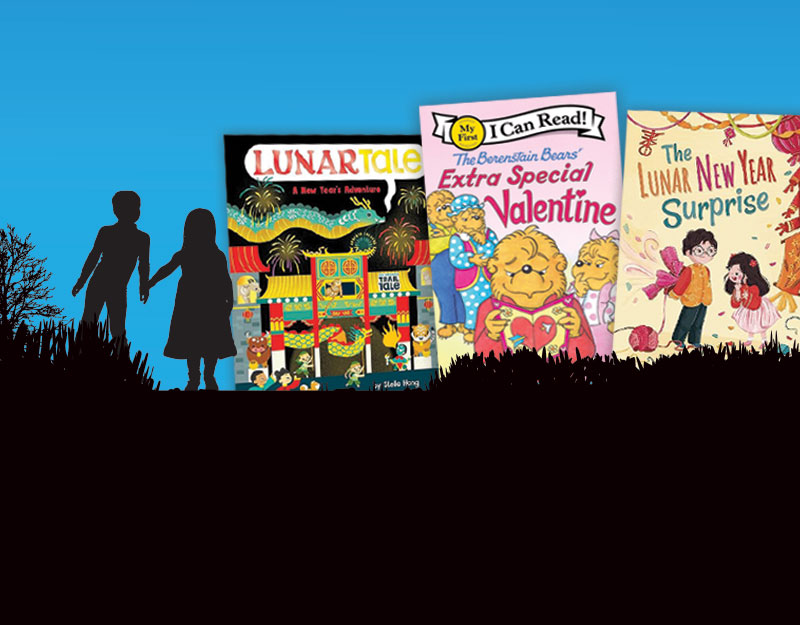
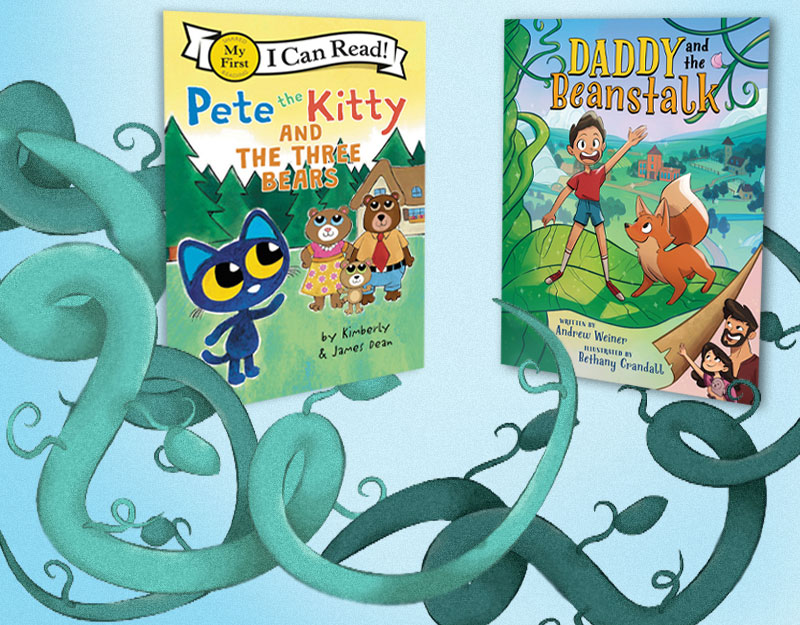
I will probably go broke finding excuses to gift the small rural Maine library where my Golden Retriever Therapy Dog and I participate in story time. Or I could simply refuse to window-shop each compelling review you write. My Head Has a Bellyache has been in my awareness for some time. Today I had a chance to learn so much about it and some sneak peeks, too. Thanks, Betsy, for all you give.